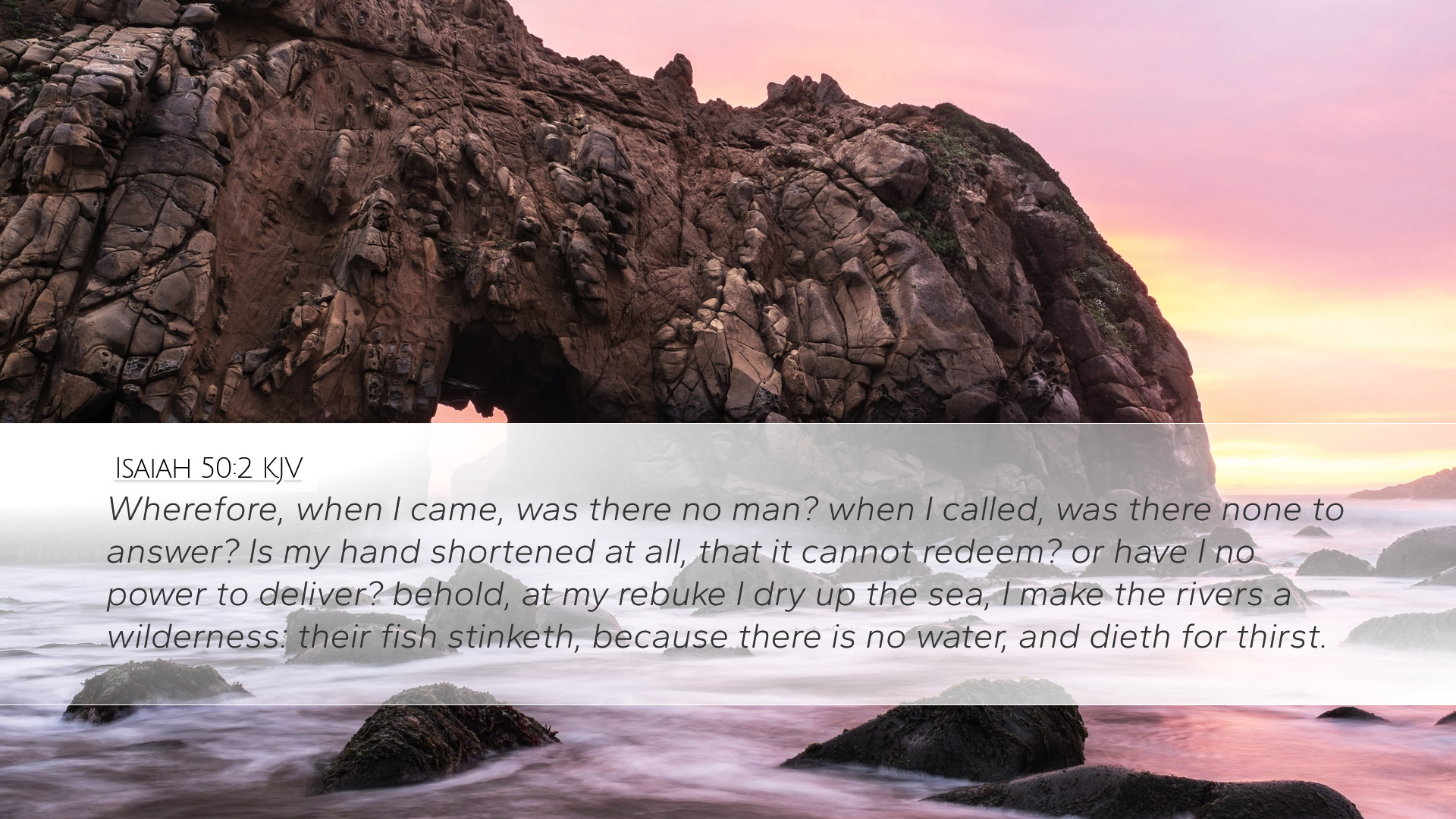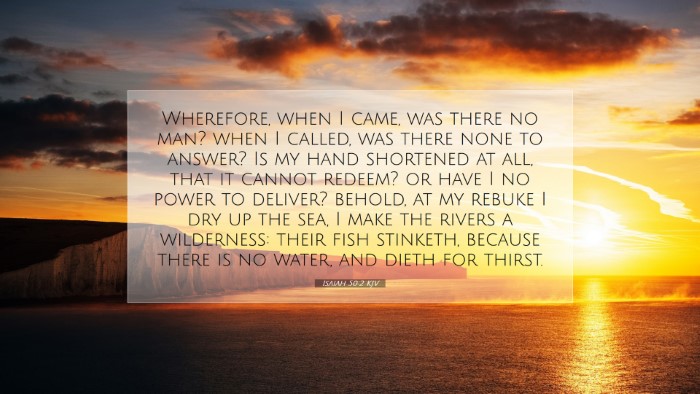Commentary on Isaiah 50:2
Verse: "Wherefore, when I came, was there no man? when I called, was there none to answer? is my hand shortened at all, that it cannot redeem? or have I no power to deliver? behold, at my rebuke I dry up the sea, I make the rivers a wilderness: their fish stinketh, because there is no water, and dieth for thirst."
Introduction
Isaiah 50:2 reveals profound theological insight, illustrating both the power of God and the failure of humanity to respond to His call. The prophet Isaiah, through divine revelation, speaks both of God's omnipotence and of the lament for mankind’s indifference.
The Call and the Silence
The text opens with a poignant question, "Wherefore, when I came, was there no man?" This question highlights the absence of a responsive audience. Matthew Henry notes that God's visitation often goes unrecognized, reflecting a troubling reality of spiritual apathy among people. The phrase indicates an expectation; God anticipates a response from His people, which emphasizes the relational dynamics between the Creator and His creation.
Albert Barnes emphasizes that God's coming is not in vain but purposeful. The lack of an answer signifies a barrier between divine intention and human response. The prophet expresses a deep sense of disappointment akin to a shepherd neglected by his flock. This resonates profoundly with pastors and church leaders who can relate to the challenge of engaging congregants in spiritual matters.
The Implications of Divine Power
The rhetorical question, "is my hand shortened at all, that it cannot redeem?" serves as a powerful assertion of God's sovereignty and omnipotence. Adam Clarke elaborates on this, underscoring that God’s strength is never diminished. The image of God’s outstretched hand symbolizes His readiness to save, reaffirming His capabilities to intervene in human affairs.
Furthermore, this verse invites readers to reflect on the nature of God's interventions. While He is always positioned to assist, the question remains whether humanity is willing to respond. Matthew Henry indicates that God’s ability to redeem remains unchanged, even when the world faces hardships. Indeed, God’s omnipotence does not wane, yet His outreach often goes unanswered as people continue in sin and rebellion.
Human Response and Divine Longing
As the verse progresses, it confronts the reader with another question: "or have I no power to deliver?" Here, the emphasis lies on God's unwavering power, akin to a parental figure pleading with a wayward child. Barnes notes that the implication is twofold; while God possesses all power to deliver, the onus also lies on humanity to seek that deliverance. This conveys that while God is willing and able to act, the human heart must be inclined toward divine mercy.
This plea for attention reveals divine desire for relationship; it is not merely about power but about connection. Henry observes that God’s call reflects His intimate yearning for His creation, urging humanity to turn towards Him rather than remain in spiritual desolation.
The Imagery of Divine Judgment
The latter part of the verse states, "behold, at my rebuke I dry up the sea." This vivid imagery illustrates God's judgment over nature as a metaphor for His authority. Clarke points out that God has power over the natural world, demonstrating His absolute sovereignty. He commands the elements at will, a reminder that God is not merely a distant deity but one intimately involved in creation.
The resulting wilderness and desert imagery encapsulate the devastating effects of divine judgment—“their fish stinketh, because there is no water.” This paints a picture of desolation, akin to the spiritual emptiness experienced when God's voice goes unheard. Barnes notes that the absence of water signifies the deeper thirst of humanity for spiritual sustenance. It reminds us that disregard for God leads to a parched spirit.
Conclusion
Isaiah 50:2 serves as a call to awareness—to recognize the God who calls, to respond to His outreach, and to acknowledge His sovereignty. It propels pastors, students, theologians, and scholars to consider the implications of divine silence and human indifference. As they delve into this verse, the juxtaposition of God's omnipotence against humanity's apathy challenges them to examine their own spiritual responsiveness.
Ultimately, the message of Isaiah transcends time and continues to echo in the hearts of believers today. It is an invitation to awaken to the voice of God, to seek His redemptive power actively, and to engage in a meaningful relationship with the Almighty.


